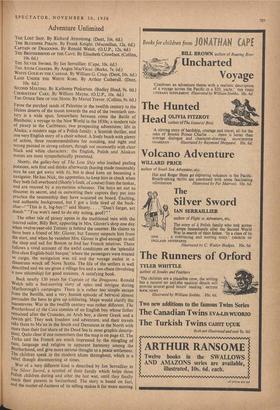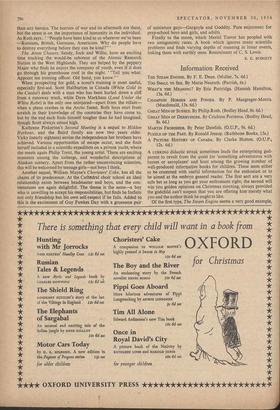Adventure Unlimited
10s. 6d.)
THE ATOM CHASERS. By Angus Mac Vicar. (Burke, 7s. 6d.)
10s. 6d.)
SECOND MEETING. By Kathrene Pinkerton. (Bodley Head, 9s. 6'd.) CHORISTERS' CAKE. By William Mayne. (O.U.P., 10s. 6d.) THE OTHER SIDE OF THE MOON. By Meriol Trevor. (Collins, 9s. 6d.) FROM the parched sands of Palestine in the twelfth century to the lifeless deserts of the moon towards the end of the twentieth cen- tury is a wide span. Somewhere between come the Battle of Blenheim; a voyage to the New World in the 1830s; a modern tale of piracy in the Caribbean; two prospecting adventures; life in Alaska; a modern saga of a Polish family; a Scottish thriller, and one very. English story of a choir school. A lively batch with plenty of action, three recommendations for scouting, and right and wrong painted in strong colours, though not necessarily with clear black and white characters: the English, Polish and Alaskan stories are most sympathetically presented.
Shorty, the galley-boy of The Lost Ship who loathed peeling potatoes, acts first and thinks afterwards (having made reasonably sure he can get away with it), but is dead keen on becoming a navigator. He has Nick, the apprentice, to keep him in check when they both fall overboard (Shorty's fault, of course) from the tanker, and are rescued by a mysterious schooner. The boys set out to discover its secret, and in outwitting their captors they put into practice the seamanship they have acquired on board. Exciting, and authentic background, but I got a little tired of the back- chat-' "This is it, big-boy!" said Shorty. . . . "Don't forget, act dumb." "You won't need to do any acting, goof !" ' The other tale of piracy opens in the traditional vein with the scarred sailor, Billy Batt, appearing in Mrs. Glover's shop one day when twelve-year-old Tommy is behind the counter. He claims to have been a friend of Mr. Glover, but Tommy suspects him from the start, and when he vanishes Mrs. Glover is glad enough to sell the shop and sail for Boston to find her French relatives. There follows a vivid account of the awful conditions on the 'splendid first-class English-built barque,' where the passengers were treated as cargo, the navigation was nil and the voyage ended in a disastrous wreck off Nova Scotia. The life of the settlers is well described and we are given a village fire and a sea-chase (involving a new steamship) for good measure. A satisfying book.
Back nearly 130 years for Captain of the Dragoons. Ronald Welch tells a fast-moving story of spies and intrigue during Marlborough's campaigns. There is a rather too simple escape from the Bastille, and a very human episode of betrayal almost persuades the hero to give up soldiering. Maps would clarify the manoeuvres. War in the twelfth century was rather different. The Brotherhood of the Cave consists of an English boy whose father remained after the Crusades, an Arab boy, a clever Greek and a Jewish girl. They seek freedom and adventure, and their travels take them to Ma'an in the South and Damascus in the North with more than their fair share of the Dead Sea (a most graphic descrip- tion). Quite clear if one remembers that the map is on page 43. The Turks and the French are much impressed by the mingling of race, language and religion in apparent harmony among the Brotherhood, and give more serious thought to a peace settlement. The children speak in the modern idiom throughout, which is a relief though disconcerting at times.
War of a very different kind is described by Ian Serraillier in The Silver Sword, a symbol of their family which helps three Polish children during and after the last war, until they finally reach their parents in Switzerland. The story is based on fact, and the matter-of-factness of its telling makes it far more moving
than any heroics. The horrors of war and its aftermath are there, but the stress is on the importance of humanity in the individual. As Ruth says : "People have been kind to us wherever we've been —Russians, British, Germans, Americans. Why do people have to destroy everything before they can be kind?"' The Atom Chasers, Sandy, Jock and Willie, have an exciting time tracking the would-be saboteur of the Atomic Research Station in the West Highlands. They are helped by the peppery Major who finds he enjoys the company of youth, even if it does go through his greenhouse roof in the night. ' "Tell you what. Appoint me training officer. Old hand, you know."' When prospecting for gold, a scout's training is most useful, especially first-aid. Scott Haliburton in Canada (White Gold in the Cassiar) deals with a man who has been hurled down a cliff from a runaway truck, while Dave Markham (Land Under the White Robe) is the only one uninjured—apart from the villain— when a plane crashes in the Arctic forest. Both boys start from scratch in their knowledge of the countries they have come to, but by the end each finds himself tougher than he had imagined, though Scott always aimed high.
Kathrene Pinkerton's Second Meeting is a sequel to Hidden Harbour, and the Baird family are now two years older. Vicky (nearly eighteen) envies the independence her brothers have achieved. Various opportunities of escape occur, and she finds herself included in a scientific expedition on a private yacht,where she meets again Philip Trent, the young artist. There are exciting moments among the icebergs, and wonderful descriptions of Alaskan scenery. Apart from the rather unconvincing scientists, this will be welcomed by teenage girls—not boys I think.
Another sequel, William Mayne's Chorister? Cake, has all the charm of its predecessor. At the Cathedral choir school an ideal relationship exists between headmaster and boys, and the con- versations are again delightful. The theme is the same—a boy who is unwilling to accept his responsibilities, but finds he forfeits not only friendship but his own self-respect if he fails. Added to this is the excitement of Guy Fawkes Day with a gruesome pair of miniature guys—Gargoyle and Goddity. Pure enjoyment for prep-school boys and girls, and adults.
Finally to the moon, which Meriol Trevor has peopled with two antagonistic races. A book which ignores many scientific problems and finds varying depths of meaning in lunar events, linking them with earthly ones. Reminiscent of C. S. Lewis.
E. C. BUDGETT



















































 Previous page
Previous page